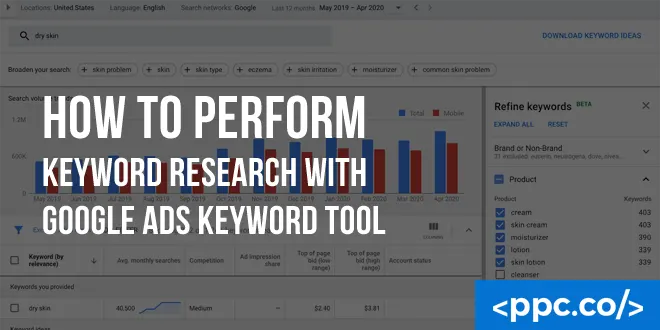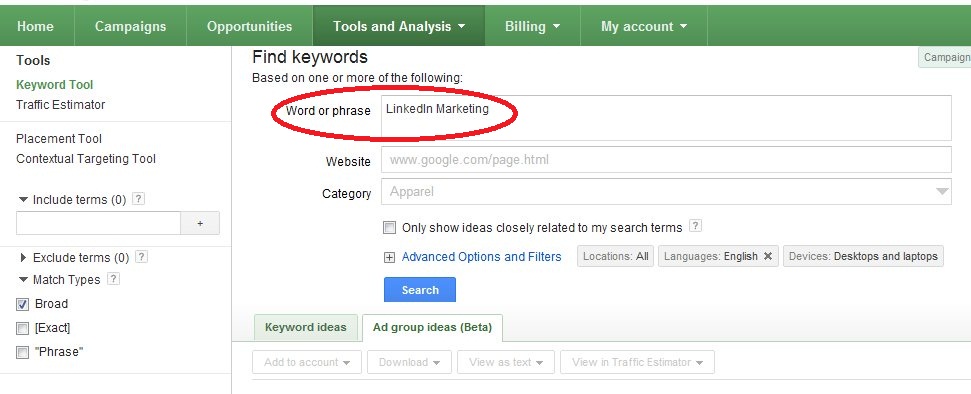


Keyword research is crucial to online marketing success, because keywords still govern the way people find information online. Keywords help us accurately find the information that we are looking for among the flood of information on the Web.
As such, proper keyword research with quality keyword research software allows you to understand what set of keywords consumers are using to find what they need. It also allows you to select proper keywords for an SEO campaign based off key metrics such as search volume, competition, and seasonal demand.
But with all the research tools available out there, which one should you use?
Here’s a hint: Marketers are vying for a prime spot on Google. Doesn’t it make sense to use a keyword tool owned by Google?
Google’s own Google Ads Keyword Tool is one of the best keyword research tools available. This is largely due to the fact that most other keyword research tools pull data directly from Google’s tool via API. While 3rd party tools often do a better job of displaying Google’s data and combining that data with other data to present proprietary or unique insights, they are broken as often as Google changes its keyword tool (which, lately, has been daily).
Since most 3rd party tools draw on data from Google’s keyword tool, my experience with them has been one of unreliability. Furthermore, the proprietary data insights that are often provided by 3rd party keyword research tools are often misleading, inaccurate, or downright useless.
Add in the fact that Google’s keyword tool is free, and you have a compelling case. Let’s take a close look at this awesome keyword research tool.
Table of Contents
ToggleIn recent years, Google Adwords Keyword Tool’s interface has gone through several transformations, but the latest has resulted in a cleaner and simpler-to-use interface.

On the main interface is the word or phrase box, where you type the keywords you’re researching. Right below it are Website and Category.
Right below the main box on the interface is the Advanced Options and Filters feature, which lets you more specifically target your research to certain countries, languages, and devices from which traffic is coming.
On the left are several features that let you customize your research further by selecting the match types of the keywords you’re looking for, whether broad or exact.
For the sake of illustration, I’ll walk you through the steps on how to do research for keywords based on Exact Match, which I recommend using for SEO campaigns.
Let’s say you’re gunning for “LinkedIn Marketing”.



4. On the left hand side of the page you’ll see Match Types

Now it’s time to move on to the next phase of the research – gleaning information from the results.
The Keyword Ideas section shows the main keywords, i.e. “LinkedIn Marketing” and the list of variations for the keywords, the Competition and the numbers for Local and Global Monthly Searches.

The list of Keywords column shows results for the main keywords and its variations. In the case of Exact Match, the column shows the exact set of words or phrases consumers use to learn about “LinkedIn Marketing”.
The Competition column shows how competition looks whether it’s Low, Medium or High. Aim for keywords with Low competition. Keywords with low competition will have a better chance of hitting the first page of Google’s search results.
But don’t discount keywords with Medium to High competition; you can target them for your long-term campaigns.
The Local Monthly Searches column shows the average number of searches for the keywords in a specific country or region in a typical month. Global Monthly Searches, on the other hand, shows the average number of people worldwide looking for information on “LinkedIn Marketing”.
For easy reference, you can download the results in spreadsheet format by hitting the Download button right above the Keyword Ideas section.
Combine insights from Google’s Keyword Tool with data from an SEO competition comparison tool such as my personal favorite, Market Samurai (that’s an affiliate link – thank you for clicking, if you do!). If you or your clients’ website metrics stack up to the competition, then go for it.
The Google Adwords Keyword Tool is an excellent keyword research tool. While it doesn’t give you exact numbers (not that any tool can), it’ll provide you with a good idea of which keywords to use as well as which ones to avoid. It’s clean, simple, and reliable, and when combined with insights from an SEO competition analysis tool, it gets the job done efficiently and effectively.
To find out more about keyword research and how to select the right keywords for your business’ PPC or SEO campaign, contact us!
Please fill the below form to download the PDF
“*” indicates required fields.
Please fill the below form to download the PDF
“*” indicates required fields.
Please fill the below form to download the PDF
“*” indicates required fields.
Please fill the below form to download the PDF
“*” indicates required fields.
Please fill the below form to download the PDF
“*” indicates required fields.
Please fill the below form to download the PDF
“*” indicates required fields.